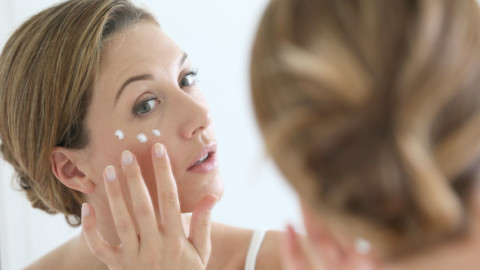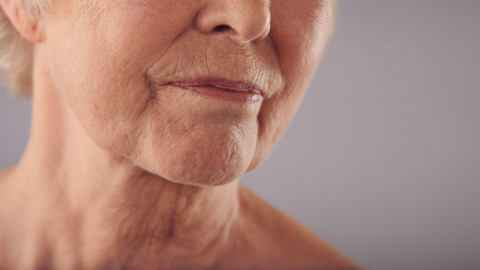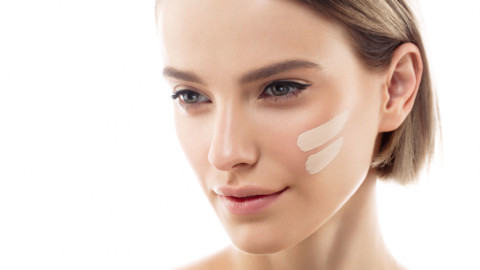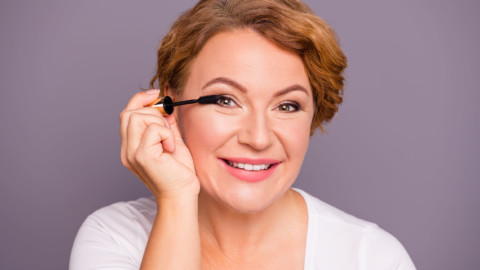Good skin isn’t something you get just by dipping your entire face in a tub of La Prairie Skin Caviar Luxe Cream before bedtime and call it a day. If only it were that easy!
Beautiful and glowy skin takes more than just buying the best products on the market. Even the most expensive cream won’t do squat if you’re using it wrong.
It’s hard to know which products are worth keeping in your skin care regime. But if your skin is suddenly feeling dry, irritable, or you’re constantly fighting breakouts, then you’re likely making these skin care mistakes without realizing it.
Mistake: You’re not using SPF when you’re indoors
Ask any dermatologist, and they’ll all tell you the same thing: you need to include sunscreen in your skin care routine. This includes slathering it all over your face, including your ears and neck.
But what you may not understand is how important it is to use sunscreen every single day, even you’re staying indoors. Yes, you’re not off the hook just because you’re working from home now.
Even if all the sunlight you’re getting is through a window in your living room, your face is not safe from the sun’s harmful rays. Standard windows only block UVB rays, but not UVA, which is known to cause premature aging, fine lines, leather-like texture, and sunspots.
You see, the sun produces two types of UV light:
- Ultraviolet A (UVA) breaks down the collagen and elastin in your skin, which causes photodamage, wrinkles, sunspots, and is even known to play a role in different types of skin cancer.
- Ultraviolet B (UVB) causes sunburns and DNA mutations that can lead to melanoma and different types of skin cancer. UVB rays are powerful enough to penetrate the outer layers of your skin and can cause blisters and sunburn.
Even if you’re not exposed to sunlight, you may still be putting your skin at risk thanks to the blue light that’s coming from computer screens, phones, tablets, fluorescent light bulbs, and flat-screen TVs. Blue light may cause pigmentation (particularly on darker skin), dark spots, and premature wrinkles.
Mistake: You’re using retinol products during the day
Let’s have a moment of honesty here.
You can’t stop the process of aging. Even if you get Botox, fillers or a facelift.
As we age, our skin loses elasticity and volume (aka fat) which causes wrinkles and fine lines to become more noticeable. But while aging is totally natural, that doesn’t mean you can’t feel self-conscious about it.
Understandably, when we notice our face getting wrinkly, we desperately want to get rid of them overnight, so we pile on retinol creams day and night.
While retinol can be a powerful anti-aging ingredient, you still need to know how to use it—and when to use it – correctly. But what does Retinol do?
- Retinol is a specific type of retinoid that derives from Vitamin A and boosts skin cell turnover, (which is the process of shedding dead skin cells and replacing the old cells with new ones).
- Retinol increases the process of skin cell turnover, causing new cells to generate, which leads to amazingly smooth and softer skin.
- Retinol boosts the production of collagen and elastin, (which starts to get slower after you hit 30), which helps to reduce wrinkles and fine lines by creating a “plumping effect”.
But exposing retinol to sunlight can decrease the product’s efficacy, so dermatologists recommend only using it at night. In fact, many retinols come neatly packaged in dark opaque bottles and tubes to prevent UV light from deactivating them.
Since retinol also makes your skin extra sensitive to UV rays, always apply SPF 30 (or higher) the next morning.
Mistake: You’re mixing skin care ingredients that you shouldn’t mix
Just like washing your face with soap isn’t enough to take care of your skin, combining a bunch of ingredients and products without proper knowledge can leave your skin irritated, dry, and blotchy. Even worse? It can leave you frustrated as hell. But that’s the thing about skin care. What works for you may not work for someone else’s skin, especially when it comes to mixing skin care products.
Certain ingredients can become irritants when you combine them with others. Of course, you can still play around with different products. You just need to know which ingredients don’t work together and which ones would cancel each other out.
So here’s a mini-guide of the most important ingredients you should never mix and the ones you should:
Vitamin C
An antioxidant that protects the skin from UV radiation and brightens your skin.
- Do mix with: Vitamin E and SPF. When you mix antioxidants like vitamin E with vitamin C you can improve these product’s efficacy and boost your overall skin care results. SPF and vitamin C also go together as both ingredients shield the skin against UV rays.
- Don’t mix with: Retinol and acids known as AHAs and BHAs (salicylic acid and glycolic acid). Vitamin C works best during the daytime, keep all these ingredients apart by using everything else at night.
Retinol
This anti-aging ingredient is a dermatologist favorite as it can reduce fine lines and even out skin tone. But it can also leave your skin feeling dry.
- Do mix with: Moisturizing ingredients like hyaluronic acid, ceramides, Niacinamide (which also keeps skin smooth), and SPF.
- Don’t mix with: Benzoyl peroxide, (they would cancel each other out), Vitamin C, (you should apply it in the morning and use retinol at night), and AHA/BHA acids (they can lead to irritation and dryness since acids are exfoliants).
AHA/BHA Acids
Lactic acid, glycolic, and salicylic acids work on the skin by exfoliating and peeling off the surface of the skin. This helps improve tone, texture, and overall brightness. But they can also be aggressive and irritate sensitive skin.
- Do mix with: Any moisturizing ingredients or SPF. It’s crucial to moisturize the skin after exfoliation to reduce dryness and irritation. Since acids cause the skin to be sensitive to the sun, always apply SPF after using these ingredients.
- Don’t mix with: Retinol and other chemical exfoliants. Mixing too many acids with anti-aging ingredients can be too rough on the skin. So never use retinol and AHA and BHA acids on the same day, or you risk getting irritation, redness, sensitive skin, and eczema.
Mistake: You’re over-washing your face
Washing your face is an important step in a skin care routine. But there is such a thing as taking it too far! In an attempt to get rid of excess oil, gunk, bacteria, and makeup buildup, you may resort to over-washing your face, especially if you’re prone to oily skin.
But this leads to over-stripping the outer layer of oil found on your skin, which actually trains your skin to release more oil (fun!) in order to overcompensate the essential moisture that’s missing.
Chronic over-washing leads to sensitive, dry, and cracked skin, and can even lead to eczema and infections. If your skin feels squeaky clean after you wash it, switch to a hydrating cleanser that’s appropriate for your skin type and protects your skin’s barrier, and only wash twice a day.
Mistake: You’re waiting too long to apply moisturizer after a shower
If you thought you had this whole skin care routine thing down, think again. There’s a popular Korean skin care trend that has been making the rounds for a few years, known as the three-second moisturizing rule.
The biggest mistake you’re making happens seconds after you hop out of the shower. Why? Because like many of us, you probably dry off your face and body completely and rush to put on a cozy bathrobe. But you should be doing something else completely: moisturizing while your skin is still damp.
The best time to apply moisturizer is right after you shower as damp skin is more receptive to absorbing the active ingredients in your face cream. It also provides an artificial barrier that helps stave off bacteria, irritants, and viruses you don’t want getting into your skin, according to the American Academy of Dermatology. Moisturizing right after you shower while the skin is damp (not wet) will help you prevent irritation, dryness, and itchiness.







